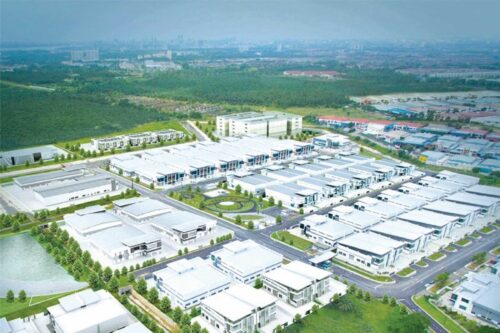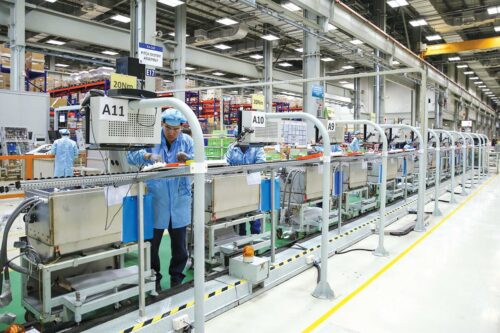Article by Mr. Dinh Hong Ky posted in the PERSPECTIVE section – vnexpress.net e-newspaper on December 6, 2017. When opening a new factory in Hung Yen in 2003, we received more than a dozen applications for the position of warehouse keeper.
Most of the candidates were experienced and had worked in state-owned enterprises. This position became the most competitive in the recruitment of hundreds of people that year. At the height of the race, a person came to our recruitment manager and said that if he was accepted as a warehouse keeper, he would work without receiving a salary.
I was quite shocked. So why did people apply here? It turned out to be interesting. He thought that like the way he did in his old place, he would live well. Being a warehouse keeper is not just about watching the warehouse, monitoring the import and export of goods and receiving a fixed salary, but by using familiar tricks, they still earn profits that are greater than their salaries. If he buys materials, he can connect with suppliers to agree on the input price sharing. If he ships the goods, he only needs to think of a reason to delay a little bit and he can receive a thank you from the other side. If he connects with other employees and partners, there are many other sources of income. He thinks that the “colorful” income from that job is the expected source of income, a few million in salary is nothing. I just realized that there is a saying “A rich warehouse keeper fills the kitchen” from the subsidy period.
I did not hire that person for the warehouse keeper position. Although I interviewed very carefully and hired someone else, for many years the warehouse keeper position has always been one of the hot seats causing headaches for our factories in the three regions.
Once, the director of a private company told me: he had finalized the price with his material supplier, but then “hinted” to the warehouse keeper to ask for more “coffee money” from the partner for each ton of imported goods. The partner agreed.
In response to my concerns, he said: “That is Vietnamese culture. They have a little more to be motivated to work with me. And I have nothing to lose. On the other side, the supplying businesses always have the mentality of wanting everything to be done quickly”.
I shared with some other businessmen, they admitted that this is not unusual. Sometimes the warehouse keeper, accountant, and office staff intentionally slow down the procedures a little, making the transaction a little more difficult; the delivery driver is a little slower; the cashier girl pays the money a few days later because she is busy. When partners and customers see this, they try to offer a pack of cigarettes and a little coffee money, then the accountant pays very quickly and the driver delivers the goods on time.
This “commission” is different from the phrase “commission fee” in developed countries. Because their commissions are regulated in detail and publicly by law. There are professions that live on commissions such as stock brokerage, real estate, insurance, etc. But commission in Vietnam is a kind of “fee”. It is negotiated at any rate, price, form, or field, from stationery, pharmaceuticals, healthcare, education, to construction, even social and charity projects.
This culture exists in joint stock companies, FDI enterprises, or 100% foreign organizations. Why? Most foreign companies send managers from abroad. This person is often not familiar with the customs of the host country, so the Vietnamese team of employees sometimes becomes more powerful and monopolistic than the boss. The commission level set for partners and suppliers is decided by the head of a certain stage and then divided among related people.
When we participated in some large projects with foreign elements, although the foreign managers were very transparent, the Vietnamese people in charge of the department still stood up to demand. As partners and suppliers, if we do not give them what they want, they will find a way to push us out. Some foreign managers knew and tried to prevent it. Once, they fired a whole group of local mid-level officials. But after a while, the new group became as corrupt as the previous group.
People talk a lot about corruption in the public sector but rarely mention corruption in the private sector.
Corruption does not only occur in public agencies, public service places such as hospitals and schools, but negative behaviors are creeping into every corner of life. It makes social and cultural ethics increasingly decline. But the bigger problem is that everyone thinks that habit is normal.
In some countries, there is a tipping culture, but it operates according to a clear rule. What is a tip different from offering to ask for money or doing everything to earn extra money beyond the salary that you deserve.
Many people do not feel that making a suggestion is shameful or violates the ethical category.
I dare not generalize. More and more private or foreign enterprises have very strict and tight rules on preventing internal corruption. They require partners and employees to sign and strictly implement. The regulations are very clear and have sanctions for “sharing”, eating out with partners or receiving gifts, including Tet gifts and gifts on holidays.
When the culture of commissions has become a custom and is recognized by the actions of many people, integrity will live.
Dinh Hong Ky


